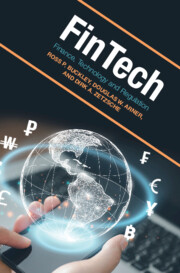Book contents
- FinTech
- FinTech
- Copyright page
- Contents
- Figures
- Acknowledgements
- Abbreviations and Technical Terms
- 1 Introduction
- Part I Digital Transformation of Finance and Regulation
- Part II Addressing the Challenges of Innovation in Finance
- Part III Building Better Financial Systems
- 12 Building the Infrastructure for Digital Financial Transformation
- 13 Digital Identity
- 14 Electronic Payments, Stablecoins, and Central Bank Digital Currencies
- 15 Digital Financial Transformation
- Part IV From FinTech to TechFin to BigTech to FinTech 4.0
- Part V Conclusion
- Index
15 - Digital Financial Transformation
Lessons from the EU
from Part III - Building Better Financial Systems
Published online by Cambridge University Press: 09 November 2023
- FinTech
- FinTech
- Copyright page
- Contents
- Figures
- Acknowledgements
- Abbreviations and Technical Terms
- 1 Introduction
- Part I Digital Transformation of Finance and Regulation
- Part II Addressing the Challenges of Innovation in Finance
- Part III Building Better Financial Systems
- 12 Building the Infrastructure for Digital Financial Transformation
- 13 Digital Identity
- 14 Electronic Payments, Stablecoins, and Central Bank Digital Currencies
- 15 Digital Financial Transformation
- Part IV From FinTech to TechFin to BigTech to FinTech 4.0
- Part V Conclusion
- Index
Summary
Europe’s path to digitisation and datafication in finance has rested upon four apparently unrelated pillars: (1) extensive reporting requirements imposed after the Global Financial Crisis to control systemic risk and change financial sector behaviour; (2) strict data protection rules; (3) the facilitation of open banking to enhance competition in banking and particularly payments; and (4) a legislative framework for digital identification imposed to further the European Single Market. This chapter suggests that together these seemingly unrelated pillars have driven a transition to data-driven finance. The emerging ecosystem based on these pillars aims to promote a balance among a range of sometimes conflicting objectives, including systemic risk, data security and privacy, efficiency, and customer protection. Furthermore, we argue that Europe’s financial services and data protection regulatory reforms have unintentionally driven the use of regulatory technologies (RegTech), thereby laying the foundations for the digital transformation of European Union (‘EU’) financial services and financial regulation. The EU experiences provide insights for other countries in developing regulatory approaches to the intersection of data, finance, and technology.
- Type
- Chapter
- Information
- FinTechFinance, Technology and Regulation, pp. 234 - 246Publisher: Cambridge University PressPrint publication year: 2023

